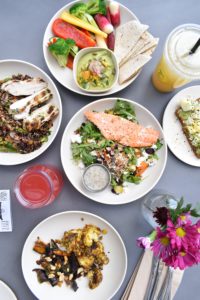 The Healing Power of the Autoimmune Protocol AIP Diet: A Naturopath’s Perspective
The Healing Power of the Autoimmune Protocol AIP Diet: A Naturopath’s Perspective
I’m Leah, a naturopath and nutritionist. As someone living with Graves’ disease, an autoimmune condition affecting the thyroid and Rheumatoid arthritis (RA), I intimately understand the significance of finding holistic approaches to managing autoimmune disorders.
I first heard about the AIP or Autoimmune Protocol Diet, when I was at university. Although I did learn that it is important not to remove food groups without good reason, this diet sounded like an interesting thing to experiment on myself.
I am a firm believer that I can’t ask a patient to do a diet if I am not willing to try it myself.
Transitioning to the AIP diet wasn’t without its challenges, but the rewards have been beyond measure.
What is the AIP Diet?
The Autoimmune Protocol (AIP) diet is a comprehensive, science-based approach that aims to alleviate autoimmune symptoms, reduce inflammation, and support overall healing. At its core, the AIP diet seeks to reset the immune system by removing potentially triggering foods and replacing them with nutrient-dense, gut-healing alternatives.
Sounds good enough and can’t be that hard!
.
The AIP Diet: What to Eliminate:
The AIP diet involves an elimination phase of foods that have the potential to exacerbate inflammation and autoimmune symptoms. Some of the key exclusions include:
1. Grains: Wheat, barley, rice, and other grains are known to contribute to gut issues and inflammation. Click for a comprehensive list of all products containing gluten.
2. Legumes: Beans, lentils, and peanuts are omitted because of their potential to disrupt gut health.
3. Dairy: Dairy products are known allergens and can exacerbate autoimmune reactions.
4. Processed Foods: Artificial additives, preservatives, and chemicals are off the table.
5. Nightshades: Vegetables like tomatoes, Chilli, Capsicum, and eggplants contain compounds that may trigger inflammation in some individuals.
My initial thought was, What! How am I supposed to live without all those foods !
The AIP Diet: What to Eat
On the AIP diet, the focus shifts toward foods that promote gut health, reduce inflammation, and provide essential nutrients:
1. Vegetables: A wide variety of colourful, non-nightshade vegetables are encouraged.
2. Fruits: Fresh, whole fruits become a staple for their vitamins and antioxidants.
3. Quality Meats: Grass-fed and pasture-raised meats are preferred for their healthier fat profiles.
4. Fatty Fish: Salmon, mackerel, and sardines supply omega-3 fatty acids, renowned for their anti-inflammatory properties.
5. Healthy Fats: Avocado, coconut oil, and olive oil feature prominently due to their benefits for the immune system and overall health.
6. Bone Broth: This nutrient-rich elixir supports gut health and provides vital amino acids.
7. Fermented Foods: Probiotic-rich foods like sauerkraut and kefir bolster gut flora and the immune system.
The Reintroduction Phase:
After a period of strict elimination (usually a few weeks to a few months), foods are systematically reintroduced one at a time.
This phase helps individuals identify specific triggers that worsen their symptoms, allowing for a more personalised and sustainable approach to eating.
I have personally found I can tolerate some foods for a few months or even years (great for the holiday season) and then all of a sudden I need to go back to doing an elimination phase again.
The Benefits I had eating the AIP
1. Reduced Inflammation: The AIP diet is known for its potent ability to quell inflammation, offering relief from painful autoimmune symptoms like arthritis.
If I have something I know I shouldn’t. I have aching fingers the next morning from my RA.
2. Gut Health: Prioritising gut-friendly foods promotes a healthy microbiome, which is essential for overall well-being. No longer feeling bloated and sluggish makes it totally worth the effort.
3. Vibrant Energy: Nutrient-dense meals provided me with newfound vitality and a renewed sense of wellness. To have the energy to play with my granddaughter is so rewarding.
4. Mindful Nourishment: The AIP diet has deepened my appreciation for the healing power of food, encouraging a more intentional and nourishing relationship with what I eat.
The AIP diet is not always the easiest diet to totally follow. However, it is a path to healing, empowering individuals with autoimmune disorders to take control of their health.
I encourage anyone facing the challenges of autoimmune symptoms to explore this transformative approach with the guidance of a healthcare professional. Remember that your journey is unique, and the AIP diet can be tailored to your specific needs. With love, intention, and a focus on nourishing your body, you can embark on a journey toward vibrant health.
I would love to work with you and help you with your personal journey to better health.
My clinic is at North Gosford on the Central Coast
Video conferencing Australia Wide